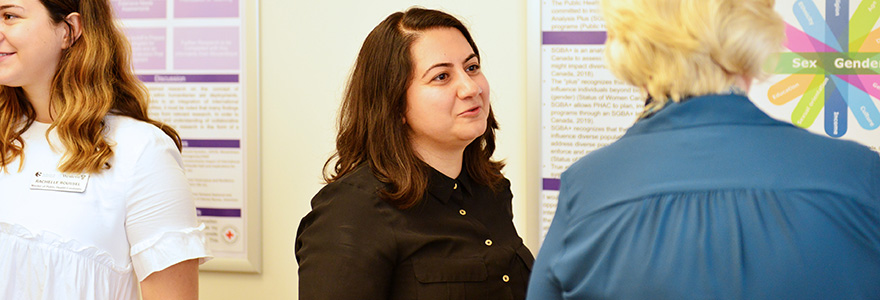Finding focus in the grey
By Jennifer Parraga, BA’93
Working alongside volunteer agencies in Vancouver’s downtown eastside, Master of Public Health (MPH) Candidate Nour Kachouh realized that she wanted to dedicate her work to supporting people who are most impacted by oppression and marginalization.“I wanted to move in a direction where I could change policy and prevent future crises, like the opioid poisoning crisis that struck the neighbourhood,” she said.
As a volunteer, Kachouh saw first-hand the complexity of the issues that many people living in the area were experiencing. It’s where she first learned about harm reduction and housing first policies and how they can make an impact and make
“I had spent many years volunteering for agencies in the community, and I had thought about pursuing public health. When I saw for myself the homelessness, poverty and high levels of addiction caused by systemic oppression, I knew that I wanted to dedicate myself to supporting people experiencing the impacts of issues,” she said.
“I had been out of school for five years,” said Kachouh. “So it was a lifestyle change to become a full-time student again – but it was worth it.”
The daily discussions with her 56 classmates that focused on real-world issues and health topics in the media, and the opportunity to apply theories to real public health cases energized Kachouh.
Not only did those discussions allow her to enhance her critical thinking skills, but it also revealed to her how much uncertainty exists in the world of public health.
“In those discussions, I realized just how much grey there is in the world and there are so many nuances, contexts and systems we need to be thinking about. We were all challenged to think more critically about our approach to the cases we studied and find clarity and answers.”
Heading into the Program, Kachouh assumed she was going to graduate with her beliefs solidified. But she spent many months questioning her beliefs and values and spent a great deal of time on self-reflection.
“I thought a lot about who I would represent as a public health professional and what values I want to bring to the table in the work that I will be doing.”
Kachouh’s dedication and leadership were recognized by the Program when the faculty chose her as the 2019 Dr. M. Abdur Rab Award recipient. The Award is presented annually to the MPH student who best exemplifies the knowledge, attitudes and practice of a public health professional, and who also demonstrates academic attainment along with compassion and a sense of humanity and justice.
Dr. Rab was an expert in infectious diseases and epidemics and was internationally known for his research. He was the interim director of the MPH Program and helped to bring the Program to inception.
“For a long time, my academic journey wasn’t what I expected it to be. That changed when I came to the MPH Program,” she said. “Being able to receive an award that validates your goals and affirm that you can achieve what you set your mind to is really rewarding.”
Building on her in-class experiences, Kachouh served as a co-op student on the Health Equity and Integration team with the Public Health Agency of Canada for her 12-week practicum.
The team is a focal point of contact for sex and gender-based analysis plus (SGBA+), an analytical tool
As she looks beyond her convocation on October 23, Kachouh is extremely proud of the connections she has made with her classmates – all of whom she says are passionate and committed and have the capacity to make
She also continues to reflect on her skills and how she can enrich and use them while working to serve marginalized communities by promoting equity in health and well-being for everyone.
“In the next five years, I’m hoping to better understand how I can play a role in bridging the gap between policy and systemic change and the innovative work of grassroots organizations,” she said. “I’m considering pursuing further research or a
Right now though, she is settling back into her life in Vancouver and thinking about how best to support higher-level systems thinking projects.



